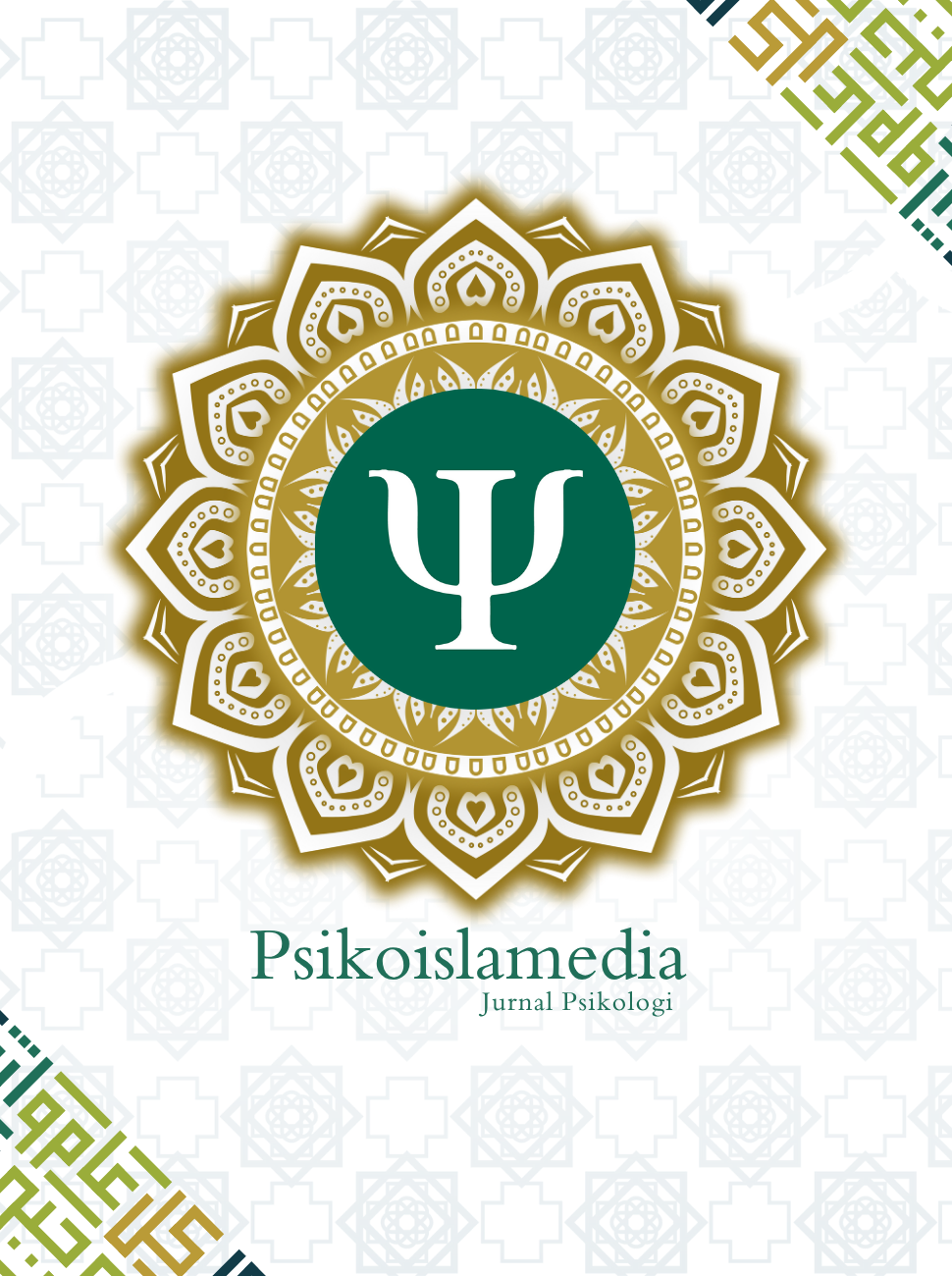STRESS MANAGEMENT INTERVENTION IN CAREGIVERS OF PEOPLE WITH SCHIZOPHRENIA AT PUSKESMAS X YOGYAKARTA
DOI:
https://doi.org/10.22373/psikoislamedia.v8i2.19811Keywords:
Stres Management, Caregiver, SkizofreniaAbstract
Being a caregiver for patients with schizophrenia is not easy. Physically, caregivers certainly experience fatigue and sometimes get sick or drop. Psychologically, caregivers experience stress, anxiety, fear and others. As for the behavior shown such as anger, aggression, apathy and others. In the social aspect, of course the caregiver feels embarrassed, cornered, threatened and many other impacts. The results of the assessment using the Subjective units of Distress Scale (1-10) conducted on 6 caregivers who visited X health center, showed stress scores that were in the medium and high categories. This was reinforced by an interview with one of the caregivers and health workers at the health center. One of the efforts to reduce the stress condition of caregivers can be through psychological intervention, namely stress management. This study aims to see the effect of stress management intervention on caregivers of people with schizophrenia. This study used a quasi-experimental approach with a one group pretest postest design. The sampling technique used purposive sampling. The results showed that there was a change in stress conditions after being given the intervention with an average decrease of 3 points.
References
Bloch, S. (2006). Supportive psychotherapy. In S. Bloch (Ed.), An introduction to the psychotherapies (pp. 215–235). Oxford University Press.
Carr, A. (2004). Positive Psychology: The science of happiness and human strengths. New York: Brunner-Routledge
Carter, E. (2006). Pre-packaged Guided Imagery For Stress Reduction: Initial Result. Journal Counselling Psychotherapy and Health, Vol 2, No. 2.
Carver, C. S., & Connor-Smith, J. (2010). Personality and Coping. Annual Review Psychology, 61, 679-704. DOI: 10.1146/annurev.psych.093008.100352
Cohen, S., & Syme, S. L. (1985). Social support and health. Academic Press.
Faridah, V.N (2018). Terapi suportif keluarga mampu meningkatkan kualitas hidup pasien gagal ginjal kronis yang menjalani hemodialisa. Prosiding Seminar Nasional, 117-123.
Franklin, C.L., Corrigan, S.A., Repasky, S.A., Thompson, K.E., Uddo, M., Walton, J.L. (2006). Stress Less: Patient Manual for the Stress Management Group. Mental Illness Research, Education, and Clinical Center (MIRECC).
Kaplan dan Sadock. (2010). Sinopsis Psikiatri Ilmu Pengetahuan Perilaku Klinis. Jilid Dua. Tangerang: Bina Rupa Asara Publisher.
Liyanovitasari, dkk. (2017). Pengaruh Terapi Suportif Kelompok Terhadap Beban dan Mekanisme Koping Keluarga Dalam Merawat Pasien Skizofrenia. NurseLine Journal, vol. 2 No.2. ISSN 2541-464X.
Lazarus, Richard S., & Folkman, Susan. (1966). Stress, Appraisal, and Coping. New York : Springer Publishing Company.Mueser,
Kim T & Jeste, Dilip V (Ed.). (2008). Clinical handbook of schizophrenia. New York, London: The Guilford Press.
Makmuroch. (2014). Keefektifan pelatihan ketrampilan regulasi emosi terhadap penurunan tingkat ekspresi emosi pada caregiver pasien skizofrenia di rumah sakit jiwa daerah surakarta. Wacana Jurnal Psikologi, 6 (11), 13-24.
Provencher. Helene L., Fournier. Jean-Pierre., Perreault., Michel.Vezin. (2000). The Caregiver’s Perception of Behavioral Disturbance in Relatives with Schizophrenia: A Stress-Coping Approach. Community Mental Health Journal, Vol. 36, No. 3: 294-298.
Rice, P. (1999). Stress and Health, 3rd Edition. California: Brooks/Cole Publishing Company
Sadock, B.J. & Sadock, V.A. (2007). Kaplan & Sadock's Synopsis of Psychiatry: Behavioral Sciences/Clinical Psychiatry, 10th Edition. Philadelphia: Lippincott Williams &. Wilkins.
Sarafino, E.P. (1998). Health Psychology Biopsychososial Interaction. New York: John Willey & Sons, Inc.
Schafer, W. (2000). Stress Management for Wellness. California: Thompson Wadsworth.
Shadish, W. R., Cook, T. D., & Campbell,. D. T. (2002). Experimental and quasi- experimental designs for generalized causal inference. Boston: Houghton Mifflin.
Sinai, Dana., Gur., Merav & Lipsitz, Joshua. D. (2012). Adherence to Interpersonal vs. Supportive Therapy for Social Anxiety Disorder, Psychotherapy Research, 22(4): 381-388. Routledge.
Siyoto, Sandu., & Sodik, Ali. (2015). Dasar Metodelogi Penelitian. Yogyakarta: Literasi Media Publishing.
Sundberg, D.N., Winebarger, A.A., Taplin, J.R. 2007. Psikologi Klinis: Edisi keempat. Yogyakarta: Pustaka Pelajar.
Suro, G & Mamani W. A. G. (2013). Burden, interdependence, ethnicity, and mental Health in caregivers of patients with schizophrenia. Family process, vol. 52, no. 2. Doi: 10.1111/famp.12002
Taylor, Shelley. (2003). Health Psychology: International Edition. New York: McGrawHill.
O’Connor, Tamara (2003). Stress Management Module. Background Information. Generic Skills Integration Project (GENSIP) Student Counselling Service & Staff Development University of Dublin Trinity College Compiled by Tamara O’Connor.
Tan, S.CH., Yeoh, A. L., Choo, I.BK., Huang, A. PH., Ong, S.H., Ismail, H., Ang, P.P & Chan, Y.H. (2012). Burden and coping strategies experienced by caregivers of persons with schizophrenia in the community. Blackwell Publishing Ltd, 21 (17-18): 2410-8. Doi: 10.1111/j.1365-2702.2012.04174.x.
Zagreb., Croatia., Barbof & Popovaca. (2013). Quality of life of key caregivers of Schizophrenia patients and association With kinship. Eur J Public Health, 21 (4): 220-223.
Downloads
Published
Issue
Section
License
Authors who publish in this Journal agree to the following terms:
- Authors retain copyright and grant the journal right of first publication with the work simultaneously licensed under Attribution-ShareAlike 4.0 International (CC BY-SA 4.0) allows others to share the work with an acknowledgment of the work's authorship and initial publication in this journal.
- Authors are able to enter into separate, additional contractual arrangements for the non-exclusive distribution of the journal's published version of the work (e.g., post it to an institutional repository or publish it in a book), with an acknowledgment of its initial publication in this journal.
- Authors are permitted and encouraged to post their work online (e.g., in institutional repositories or on their website) prior to and during the submission process, as it can lead to productive exchanges, as well as earlier and greater citation of published work. (See The Effect of Open Acces)














